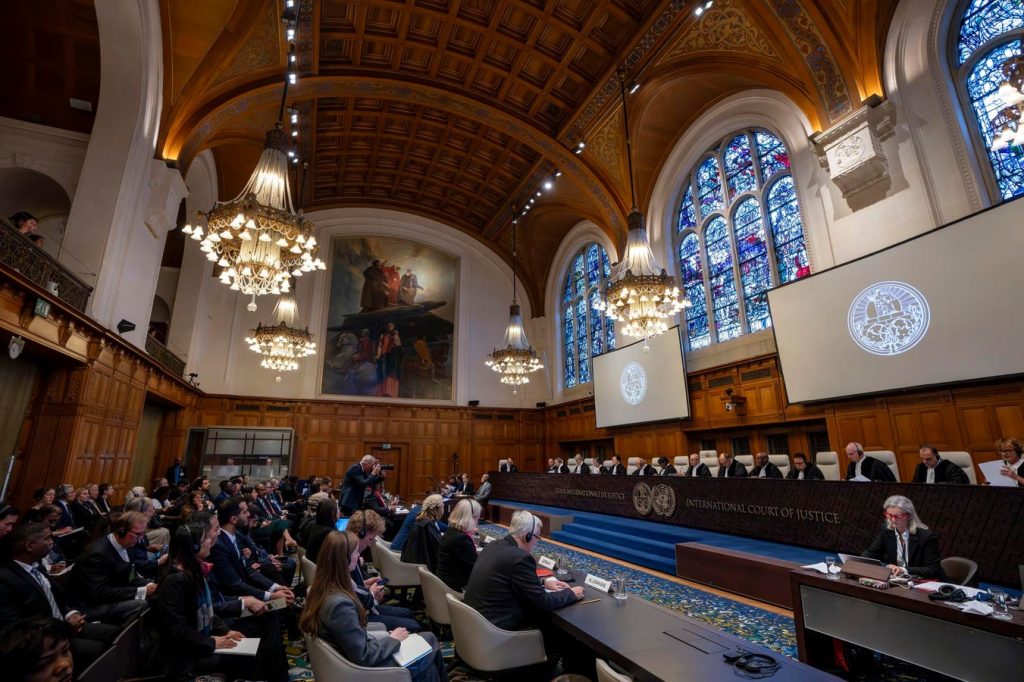A Global Reckoning: The International Court of Justice and the Future of Climate Change Liability
The first two weeks of December 2024 witnessed a historic event at the International Court of Justice (ICJ) in The Hague. At the behest of the United Nations General Assembly, the World Court convened to hear arguments regarding the obligations of states in respect to climate change. The central question: what legal and financial responsibilities do nations bear for their contributions to the climate crisis, and what actions are they compelled to take to avert further environmental degradation? This advisory opinion, while non-binding, carries significant weight, potentially shaping future climate litigation and influencing the development of international climate law.
The request for the ICJ’s advisory opinion stemmed from a March 2023 appeal by the island nation of Vanuatu, a country acutely vulnerable to the impacts of rising sea levels and extreme weather events fueled by climate change. Over 100 countries and interested parties presented their cases before the court, engaging in a complex legal debate centered on the Paris Agreement and the obligations it imposes on nations to curb greenhouse gas emissions. A central point of contention revolved around the responsibility of fossil fuel-producing countries to limit or cease production, and the related issue of fossil fuel subsidies.
The crux of the legal arguments rested on differing interpretations of the Paris Agreement. Many nations argued that the agreement, through its mechanisms for updating nationally determined contributions (NDCs) and the global stocktake process, implicitly requires states to address fossil fuel production and subsidies. These arguments highlight the imperative of aligning national climate strategies with the latest scientific evidence, which unequivocally points to the need for a rapid transition away from fossil fuels. Conversely, several countries, including major fossil fuel producers, asserted that the Paris Agreement focuses on emissions reduction, not the source of those emissions. They emphasized national sovereignty over natural resources and the right of states to exploit their own resources for economic development.
The hearings culminated in a series of pointed questions from four ICJ judges, focusing specifically on the obligations of fossil fuel-producing states. Judge Sarah Cleveland of the United States directly addressed the issue of fossil fuel production and subsidies, querying the specific obligations of states under international law to protect the climate system from anthropogenic greenhouse gas emissions. This question sparked a flurry of contrasting responses, laying bare the deep divisions among nations on this critical issue.
The responses to Judge Cleveland’s question revealed a spectrum of legal interpretations and national interests. The United States, a major fossil fuel producer, argued that international law, including the Paris Agreement, does not impose specific obligations on states regarding fossil fuel production or subsidies. This position contrasts sharply with that of the United Kingdom, which contended that the Paris Agreement, through its NDC and global stocktake mechanisms, inherently requires states to address fossil fuel production and subsidies.
Other nations offered nuanced perspectives. Russia argued that states are obligated to reduce emissions within their territories, regardless of the source of those emissions, emphasizing a distinction between emissions reduction and combating the sources of emissions. Mexico highlighted the need for a just and equitable transition away from fossil fuels, particularly for developing countries heavily reliant on fossil fuel industries, invoking the principle of Common but Differentiated Responsibilities and Respective Capabilities (CBDR-RC). Kuwait, invoking the principle of state sovereignty over natural resources, argued against specific obligations to limit fossil fuel production. India echoed this sentiment, adding that fossil fuel subsidies are often necessary for developing countries to address poverty and energy security.
The European Union and Canada adopted more cautious stances, acknowledging the centrality of transitioning away from fossil fuels while stopping short of asserting specific legal obligations related to production or subsidies. Conversely, the Commission of Small Island States on Climate Change and International Law (COSIS) strongly argued for a legal obligation to transition away from fossil fuels, based on the overwhelming scientific consensus demonstrating the link between fossil fuels and climate change.
The responses from China and the Bahamas offered further layers of complexity. China, another major fossil fuel producer, emphasized the UNFCCC’s recognition of state sovereignty over natural resources and the need to consider the special circumstances of countries whose economies are heavily dependent on fossil fuels. The Bahamas, while acknowledging the principle of state sovereignty in choosing how to meet mitigation obligations, argued that the best available science requires a substantial and urgent reduction in fossil fuel use, suggesting an implicit obligation on producing states to facilitate this transition.
The divergent views expressed at the ICJ hearings underscore the complex interplay of legal principles, national interests, and scientific imperatives in addressing climate change. The ICJ’s advisory opinion, expected in the coming months, will provide a crucial legal interpretation of state obligations in the face of the climate crisis. The opinion will likely influence future climate litigation, potentially opening avenues for holding states accountable for their contributions to climate change, including their support for fossil fuel industries. It also has the potential to inform negotiations under the UNFCCC and shape national climate policies, particularly regarding fossil fuel production and subsidies. The world is watching, and the stakes are high. The ICJ’s decision will be a defining moment in the global effort to address the existential threat of climate change.












